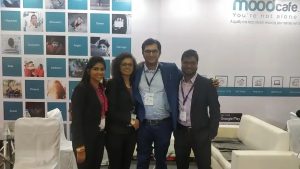Lifting Spirits at MoodCafe

It was just another day, the calendar displayed — 10th of October. Anusha snoozed the alarm clock for the 10th time at 2 in the afternoon. Having slept for over 12 hours now, she finally gathered the strength to open her eyes. She thought it was the excess of alcohol consumption that was causing the morning dizziness but deep down she knew that the real reason was much bigger. She was still in her bed till 5 in the evening and sipping her third cup of coffee and thinking about her life, she reminisced herself as a bright, go-to-get woman, who was always energetic and excited to try new endeavors in life, but here she was, barely able to understand her feelings. Anusha skype called her best friend Anamika, who lived in the States. She advised Anusha to see a therapist since these were early signs of depression, which, if not treated, could result in serious illness. Infuriated by her friend’s allegations, Anusha refuted her claims and cut the call. A WHO report from 2017 states that India is home to an estimated 57 million people who are affected by depression, which is 18 percent of the total number of people worldwide who suffer from the condition.
Anusha is a software engineer and works at an MNC. Her normal day comprises of waking up at 6 every morning, getting ready and travelling to work, and finishing off the day by 9 or even later. After getting back home, she would cook and do a final round of reply to emails before going to bed. She could barely sleep for 5–6 hours daily. A report by ASSOCHAM suggests that on an average 42.5% of the people in the corporate sector suffer from some sort of depression or anxiety. Due to such a hectic life, most people in India encounter some symptoms of depression like eating or sleeping too much or too little, pulling away from people and usual activities, having low or no energy, smoking, drinking or using drugs more than usual, feeling unusually confused forgetful on edge, angry, upset, worried or scared.
Anusha spoke to a few more close friends who suggested the same as Anamika had, that is to meet a therapist. After giving it a lot of thought, Anusha decided to see one but was scared and embarrassed. She was dreaded by the thought of being labelled as ‘mentally ill’. A report by the TLLLF reveals that 62% from 3556 of the people who were surveyed showed a high stigma against people with mental illness and used derogatory terms like a retard, crazy, mad/stupid. Of the respondents who showed awareness about mental illness (87%), the ones showing stigma made up to 71%.
Gathering all her courage, Anusha decided to see a therapist, staying an hour’s drive away from her place. On her way, she read ‘The Mental Health Act’ passed by the Indian government in 2017. According to the Act, ‘Mental Illness can be defined as a substantial disorder of thinking mood, perception, orientation or memory that grossly impairs judgement behavior, capacity to recognise reality or ability to meet the ordinary demands of life, mental conditions associated with the abuse of alcohol and drugs, but does not include mental retardation which is a condition of arrested or incomplete development of mind of a person specially characterised by subnormality of intelligence.’
Further, the act also talked about the rights of a person suffering from depression. The right to access mental healthcare and treatment of good quality at affordable cost without being discriminated against based on gender, caste or religion. The act impedes segregation by society. During her visit to the counsellor, Anusha felt uncomfortable as she was afraid of somebody recognizing her in the vicinity. There are several taboos associated with seeing a therapist and that resonated in her brain again and again. So, after coming back home she looked up online if she could find any other service. Anusha stumbled upon Moodcafe, a startup by IIMA Alum Mikul Patel. The startup aims to bring a new-age empathetic and caring approach to mental health and well being by leveraging best practices and emerging research-driven trends of psychology, counselling, therapies, artificial intelligence and innovative reach out strategies.
Currently, 60 million Indians suffer from mental disorders out of which 10–20 million have severe mental disorders like schizophrenia and bipolar disorder. Nearly 50 million have mental disorders such as depression and anxiety. Despite such alarming rates, only 10% of patients get treated in India compared to 82% in South Korea. According to the National Mental Health Survey of India 2015–2016, there is only 1 psychiatrist for every 2,00,000 people. Understanding the current scenario, and capturing an approximately $10 Billion market and intending to help people, Mikul Patel along with his friend, Rahul Mirdha, started Moodcafe, a platform to vent out feelings anonymously.
Mikul is a graduate from IIT Roorkee and completed his MBA in 2019 from IIMA. In the past, he co-founded a logistics venture — transport.co.in. Rahul is also an alumnus of IIT Roorkee. After graduation, he experienced personal problems himself and started developing a technology-based product to solve the same. Later he left his job and joined Moodcafe to work full time in the mental health sector. The team also consists of a psychologist, Poonam Malpani who has been trained in clinical psychotherapy and rational emotive behaviour therapy and Heli Patel who leads the marketing team.
Moodcafe also offers online counselling where one can book an appointment with the psychologist and talk via chat, video or in-person. Currently, there are 10 psychologists on board. The psychologists are chosen in a threefold process: First, they should have a master’s in clinical psychology or counselling; second, they should have had a minimum practice of 2.5 years, and at the end, they undergo a personal interview round with the head psychologist at mood cafe.
Finally, Anusha successfully attempted her 1st online counselling session through Moodcafe.
The symptoms seen in Anusha’s case were the result of a lot of factors. It is important to understand that different aspects of our life are interrelated and might affect our relations, daily living, occupational life and also our physical health, such as with Anusha’s case, where the cause was her lifestyle. Depression and anxiety have a significant economic impact; the estimated cost to the global economy is $US 1 trillion per year in lost productivity. To bridge the gap between the stigma, lack of time, rise of stressful environments and the need for professional help, mood cafe provides services to the corporate sector as well. They provide counselling and workshops on various productivity and mental wellness topics such as work-life balance, stress management, relationship management, time management etc. They also offer analytics on overall health, productivity, or problems faced by their employees to know what is wrong and take appropriate action. They have recently signed an MOU with Manipur International University, where they will provide a holistic solution to the students and staff involving workshops, therapy sessions, and analytics. The startup has won various accolades such as the Idea Chaupal and has recently been endorsed by the Gujarat Government. The Moodcafe app is available on the play store and has had 3500+ downloads. The startup has also recently raised an undisclosed amount in an angel investment round from 7 angel investors.
For more information visit Moodcafe.in
Disclaimer: Names and stories mentioned in this article are hypothetical.
